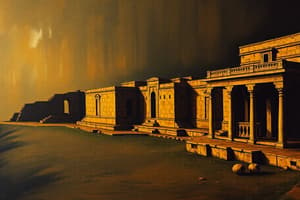Podcast
Questions and Answers
What was a significant feature of urban planning in Mohenjodaro?
What was a significant feature of urban planning in Mohenjodaro?
- Buildings were constructed with mud bricks.
- Streets were random and unorganized.
- The city was circular in layout.
- Sophisticated drainage systems were in place. (correct)
Which of the following structures is believed to have held significance for religious or ritualistic purposes in Mohenjodaro?
Which of the following structures is believed to have held significance for religious or ritualistic purposes in Mohenjodaro?
- The Marketplace
- The Great Bath (correct)
- The Granary
- The Assembly Hall
What evidence suggests a complex society in Mohenjodaro?
What evidence suggests a complex society in Mohenjodaro?
- Existence of pyramids and large monuments.
- Standardized baked bricks in construction.
- Artifacts indicating trade with Mesopotamia. (correct)
- Seals and inscriptions were found in various languages.
What is one of the theories regarding the decline of Mohenjodaro around 1900 BCE?
What is one of the theories regarding the decline of Mohenjodaro around 1900 BCE?
What aspect of Mohenjodaro's culture remains largely a mystery to historians?
What aspect of Mohenjodaro's culture remains largely a mystery to historians?
Study Notes
Mohenjodaro
-
Location:
- Situated in present-day Sindh, Pakistan, near the Indus River.
-
Historical Context:
- Part of the Indus Valley Civilization (IVC), which flourished from approximately 2600 to 1900 BCE.
- One of the largest settlements of the IVC alongside Harappa.
-
Urban Planning:
- Notable for advanced urban planning with grid patterns.
- Streets laid out at right angles, with sophisticated drainage systems.
- Buildings made from standardized baked bricks.
-
Architecture:
- The Great Bath: A large public water tank, possibly used for religious or ritualistic purposes.
- Granary: A structure believed to have been used for storing surplus grain.
-
Society and Economy:
- Evidence of a complex society with social stratification.
- Economy based on agriculture, trade, and craft production.
- Artifacts indicate trade connections with Mesopotamia and other regions.
-
Culture and Writing:
- The script used is still undeciphered, with seals and inscriptions found throughout the site.
- Artifacts include pottery, jewelry, and figurines that reflect a rich cultural life.
-
Decline:
- Possible reasons for decline include climate change, river shifts, and socio-political factors.
- The site was abandoned around 1900 BCE, leading to theories of a gradual decline rather than sudden collapse.
-
Significance:
- Mohenjodaro is crucial for understanding early urban societies and their development.
- Offers insights into the daily life, governance, and culture of the IVC.
Location
- Located in Sindh, Pakistan, adjacent to the Indus River.
Historical Context
- Flourished as part of the Indus Valley Civilization (IVC) around 2600 to 1900 BCE.
- One of the two major settlements in the IVC, alongside Harappa.
Urban Planning
- Features advanced urban planning with grid layouts.
- Streets organized at right angles, showcasing sophisticated drainage and sanitation.
- Construction involved standardized baked bricks, indicating uniformity in building practices.
Architecture
- The Great Bath serves as a central public water facility, possibly for religious or ritualistic purposes.
- A granary structure suggests organized agricultural surplus and food storage.
Society and Economy
- Evidence indicates a complex social structure with distinct social stratification.
- The economy was diverse, rooted in agriculture, trade, and skilled crafts.
- Artifacts reveal trade interactions with Mesopotamia and various other regions.
Culture and Writing
- The civilization utilized an undeciphered script, evident in seals and inscriptions found on-site.
- Artifacts such as pottery, jewelry, and figurines highlight a vibrant cultural life and artistic expression.
Decline
- The site experienced abandonment around 1900 BCE, with possible decline factors including climate change, shifts in river patterns, and socio-political disruptions.
- Theories suggest a gradual decline rather than an abrupt collapse.
Significance
- Mohenjodaro is vital for understanding early urban societies, providing insights into their daily life, governance, and cultural practices within the IVC.
Studying That Suits You
Use AI to generate personalized quizzes and flashcards to suit your learning preferences.
Description
Explore the fascinating history of Mohenjodaro, one of the major cities of the Indus Valley Civilization. This quiz covers its urban planning, architecture like the Great Bath and Granary, as well as the societal structure and economy of the era.




